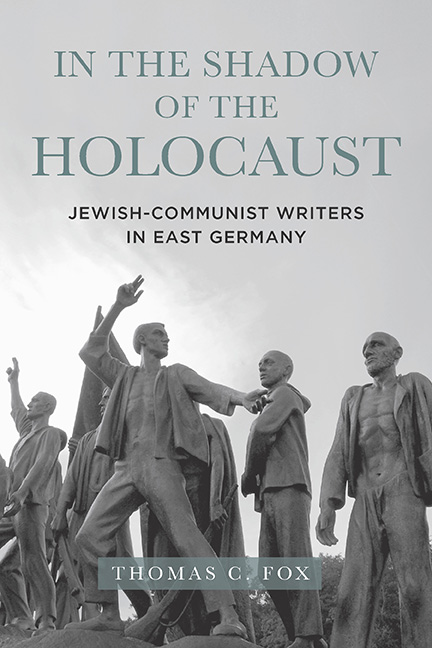Book contents
- Frontmatter
- Contents
- Preface
- Introduction: In the House of the Hangman
- Chapter One The Dead Mother: Anna Seghers
- Chapter Two Stefan Heym’s Negotiation of Communist-Jewish Identity
- Chapter Three The Dead Wife: Stephan Hermlin
- Chapter Four Expanding East German Holocaust Discourse: Peter Edel and Fred Wander
- Chapter Five The Dead Father: Jurek Becker
- Conclusion: “Let Us Speak German for an Hour.”
- Works Cited
- Index
Chapter Five - The Dead Father: Jurek Becker
Published online by Cambridge University Press: 26 May 2022
- Frontmatter
- Contents
- Preface
- Introduction: In the House of the Hangman
- Chapter One The Dead Mother: Anna Seghers
- Chapter Two Stefan Heym’s Negotiation of Communist-Jewish Identity
- Chapter Three The Dead Wife: Stephan Hermlin
- Chapter Four Expanding East German Holocaust Discourse: Peter Edel and Fred Wander
- Chapter Five The Dead Father: Jurek Becker
- Conclusion: “Let Us Speak German for an Hour.”
- Works Cited
- Index
Summary
Jurek Becker (1937–97) was a Holocaust survivor and a committed socialist. Born in Poland, he grew up in East Germany and, although he eventually moved to the West, he remained a citizen of that country until its demise in 1990. Becker set his first and most successful novel, Jakob der Lügner (Jacob the Liar, 1969), in a Jewish ghetto in Nazi-occupied Poland. Widely praised, translated into twelve languages, and made into two film versions (1974 and 1999), the novel brought Becker international fame and established him nolens volens as a “Jewish” writer. Among his subsequent production were two further novels, both set in East Germany and with pronounced autobiographical features, which dealt with the issue of what it meant to be Jewish in socialism. Becker's biographer Sander Gilman calls this trilogy “unique in postwar German writing” (2003, ix) and the most important depiction of the Jew in postwar Germany. Yet until his death in 1997, Becker had doubts regarding whether he was in fact a German Jew.
In the following I will look briefly at Becker's autobiography and then examine his trilogy as a negotiation of German-Jewish-Communist identity. Although scholars regard Becker as one of the leading German postwar writers, he was not, as we have noted, originally from Germany, nor was German his native language. Becker was born to Polish-Jewish parents in Lodz, Poland in 1937, approximately two years before the beginning of the Second World War and the Nazi occupation of Poland. In 1940, the Nazis evicted Becker and his family from their comfortable flat and interned them in the inhumane conditions of the Lodz Jewish ghetto constructed by the Germans. The Germans deported Becker's father, Max, to Auschwitz, purportedly for possessing an illegal radio. The Nazis later deported Becker, his mother Anette, and his sister to the concentration camp of Ravensbrück, which was north of Berlin. The Red Army liberated the camp in 1945, but not before Becker's sister and mother had died. Becker believed that his mother had died of starvation because she gave him her rations.
Becker's father Max survived Auschwitz, and through a US aid organization he located his eight-year-old son in Berlin after the war.
- Type
- Chapter
- Information
- In the Shadow of the HolocaustJewish-Communist Writers in East Germany, pp. 150 - 175Publisher: Boydell & BrewerPrint publication year: 2022

